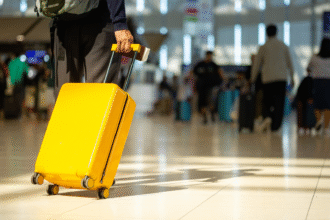Traveling internationally while your Form I‑131 (Advance Parole) application is pending involves navigating a delicate balance between urgent personal needs and the risk of jeopardizing your immigration eligibility. Advance Parole enables travel and re-entry to the U.S. for applicants with pending Adjustment of Status, DACA, TPS, asylum, or equivalent processes without abandoning the underlying application. However, understanding the authority, limitations, and risks including discretionary entry by CBP officers is critical to protecting your immigration trajectory. Applicants must also be aware that any unauthorized departure during the pending period can result in an automatic denial of re-entry or abandonment of the application. Additionally, geopolitical events, country-specific travel bans, or last-minute USCIS notifications may further complicate re-entry. Therefore, it is vital to seek legal counsel, avoid discretionary travel, and ensure all forms and approvals are properly documented and verified prior to departure.
What Advance Parole Is and Who Needs It
Advance Parole is a travel authorization that allows eligible individuals to leave the U.S. and legally re-enter while their immigration applications remain pending. It is requested using Form I-131, Application for Travel Documents and is required for Adjustment of Status applicants except those with valid H‑1B or L‑1 status. Advance Parole is also commonly used by DACA, TPS, and asylum applicants, allowing return without voiding their pending applications. (USCIS I‑131 Form Guidance)
Travel Without It Can Derail Your Application
Leaving the U.S. without valid Advance Parole typically results in abandonment of any pending Adjustment of Status application. The Travel Document Guide warns that even with an Advance Parole document, re-entry is not guaranteed CBP retains full discretion, and inadmissibility grounds may override documentation. (CBP Advance Parole Notice)
How to Apply and Manage Timing
Applicants must file Form I‑131 with USCIS, including supporting documentation such as proof of pending status, purpose of travel, and the filing fee. Standard processing can take several months; therefore, timing is crucial. Emergency Advance Parole may be granted for urgent humanitarian or educational needs, sometimes within days, upon submission of strong supporting evidence and a request to expedite. (USCIS Emergency Travel Guidance)
Risks and CBP Discretion at Re-entry
Even a valid Advance Parole document does not guarantee return. Customs and Border Protection officers may deny entry based on inadmissibility, previous immigration violations, or discretionary judgment. Legal resources caution that applicants with removal orders must exercise extreme caution: leaving the U.S. may trigger execution of the order and result in re-entry bars unless waived properly. (ILRC Advance Parole Overview)
Special Considerations for DACA and Sensitive Cases
DACA recipients may only receive Advance Parole for humanitarian, educational, or employment purposes; casual or vacation travel is not permitted. Processing times often range from four to eight months, but emergency cases may permit faster issuance. Legal assistance is strongly recommended for DACA holders, as missteps can disrupt deferred action or renewals. (Informed Immigrant DACA Guidance)
Planning Travel Responsibly
Frequently Asked Questions (FAQs)
1. Can I travel while my Advance Parole application is still pending?
No, it is strongly discouraged to travel outside the United States while your Form I‑131 is pending. If you leave before receiving official Advance Parole approval, USCIS may consider your immigration application abandoned, particularly if you’re applying for Adjustment of Status. Always wait until you have received your approved Advance Parole document in hand before making international travel plans.
2. What happens if I travel without Advance Parole and try to return to the U.S.?
If you leave the U.S. without a valid Advance Parole document while your immigration case is pending, you may be denied re-entry. In most cases, such travel will also terminate your pending application, such as a green card or DACA renewal. Even if you qualify for Advance Parole, U.S. Customs and Border Protection (CBP) officers have the discretion to deny entry for various legal or security reasons.
3. How long does it take to get Advance Parole approved?
Standard processing times for Form I-131 can range from 3 to 6 months, depending on your category (e.g., DACA, AOS, TPS). Some cases qualify for expedited processing, such as those with humanitarian emergencies or urgent work-related travel. It is always advisable to apply well in advance and monitor processing updates on the USCIS Case Status tool.
4. Is travel guaranteed once I receive my Advance Parole document?
No, even with an approved Advance Parole document, re-entry to the U.S. is not guaranteed. Your return is subject to inspection and final approval by CBP officers at the port of entry. If you have prior immigration violations, pending criminal issues, or a complex immigration history, consult an immigration attorney before traveling even with a valid document.
5. Can DACA recipients use Advance Parole to adjust status later?
In some cases, yes. Certain DACA recipients who travel with Advance Parole and return lawfully to the U.S. may become eligible to adjust status to permanent residency if they have a U.S. citizen immediate relative sponsor. However, this depends on individual circumstances, and eligibility must be reviewed by a legal expert. Resources like Informed Immigrant offer guidance tailored to DACA travelers.



